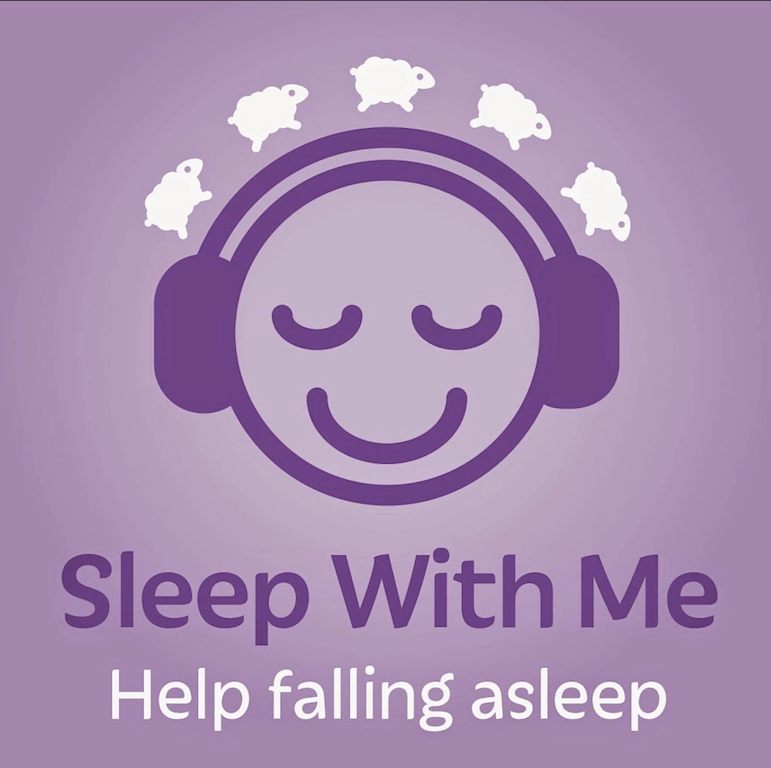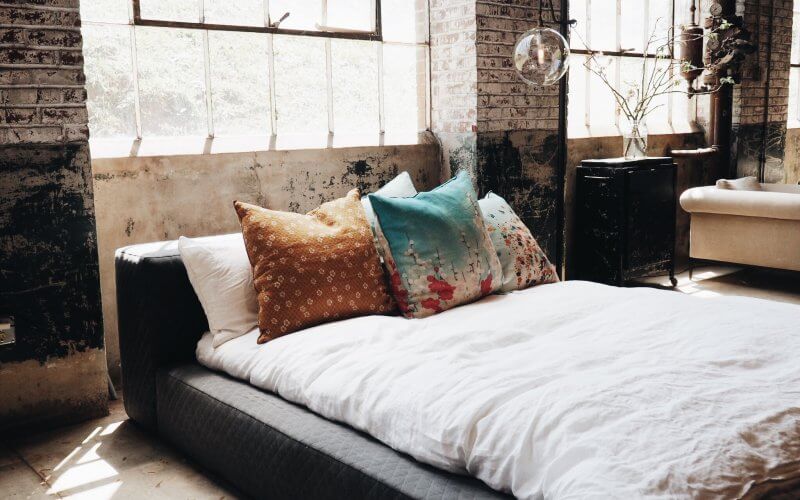This Podcast Creator Tells Grown-up Bedtime Stories to Lull You to Sleep

It’s a pretty common occurrence: you’re lying in bed, having just turned out the light, and all of a sudden, you’re wide awake. There are dozens of tried and true methods designed to calm you down. Among them: counting sheep, meditating, popping an Ambien or Nyquil (don’t try these at home, kids). But no matter what you do, your mind just won’t shut off. What they don’t tell you about this process is how frustrating it can be. No one knows this better than Drew Ackerman. Plagued with sleeping issues since childhood, Ackerman created his now-hit podcast, Sleep With Me, to reach adults across the country who need a little help hitting the sack. His method? Adult bedtime stories. Whether creating fantastical characters or detailing mundane observances, Ackerman’s tales provide solace for sleep-deprived folks everywhere, until the lights go out.
Here, we chat with him about how on earth he comes up with these stories, why podcasting, and the one bedtime routine he swears by. And next time you’re counting sheep, try out one of his tales.
Tell us about Sleep With Me — how’d you get the idea to help people fall asleep?
The podcast was born from my childhood insomnia. I had a lot of trouble sleeping as a kid, and one of the things I did was listen to the radio. It always distracted me. I never forgot that feeling — the agony of lying there, worrying about school, not being able to fall asleep, and the radio distracting me. Those feelings sat in the back of my mind and ultimately led to the creation of the podcast.
Podcasting is extremely popular right now. I don’t think telling bedtime stories for adults would work in any other medium. I was able to just experiment without the pressure of finding an audience right away until at some point I decided to try it and started releasing stories. From there, it was just refining them based on listener feedback.

You tell people these stories to aid their bedtime process. What’s the methodology there?
It’s really tough. I do a lot of it by feel and feedback. The stories have to be engaging enough and I have to create a friendly environment — a “safe place” — because I’m sending my voice across the deep dark with the goal of taking your mind off everyday life. The story has to be preferable — better than what people would normally be thinking about, like that report due or those family issues going on. And I’m always trying to stay calm and mellow. I think that’s part of the reason the podcast works — people can read your vibe.
There are things not to do, too. I stay away from things that will trigger bad memories or get people thinking. I try to consider what listeners are anxious about and to distract and lose them along the way. It’s like crafting a goofy friend. In a perfect world, everyone would have a friend who would come over and tell them a bedtime story — but I guess that would also be kind of weird…
The listeners aren’t under any obligation to keep listening. It’s implicit that you can fall asleep whenever you want, so the stories have to be engaging but not so much so that you don’t want to go to sleep. It’s not going to work for everyone. I don’t want people to feel pressure, wondering why it’s not working. Just because you can’t turn your brain off, doesn’t mean you’re doing something wrong.
You have such a healthy perspective on sleep. What has the feedback from listeners been like?
Most of the feedback is people just sharing what they’re going through and why they can’t sleep. I was on vacation recently, wondering what to do with the show while I was gone, and I got emails from different people going through really hard times — it just made me realize how much I needed to keep going.
I’m not a mental health expert, but no one really asks me for advice. It’s more of an open forum for sharing stories. It’s counterintuitive — with all of the scary things going on in our culture, from politics to social issues, people really have an appreciation for this. I’ve always been so touched by that.
Drew Ackerman, recording “Sleep With Me”
There’s such a cool opportunity to connect people around sleep. What do you think makes sleep such a crucial part of our lives?
When we say sleep is essential to a human functioning, it’s like having food or clean water. Those should be rights. And if you’re lucky enough to have access, those things are under your control. You can just take a sip.
But then you have sleep that is so critical to your health, and it’s not really under your control. It can be so frustrating and baffling, and it’s cyclical. Lack of sleep can make you worse at your job and make relationships more difficult — and then you just get into this bad cycle because you’re feeling unfulfilled or unhappy. And you can’t just grab a hamburger; it becomes a collision between your physical and mental health.
We’re always into the nerdy side of things — what kind of scientific research have you done behind your bedtime stories?
I’m not an asleep researcher, but I always feel like the one thing about not being able to sleep is that, even if you’re in a house full of people, it can feel incredibly lonely or isolating. So the podcast acts more as something that can make people feel less alone. Bedtime stories have been around for thousands of years, so it’s that same theme — it’s nice to have this human connection that doesn’t need to serve a purpose. It’s goofy and you’re not supposed to take any lessons from it. It’s either to entertain you or to help you sleep — that’s it.
Have you ever used a sleep tracker to measure your sleep? Tell us about it. How do you feel about trackers or devices to measure sleep in general?
I have used a fitness tracker and some accelerometer-based apps to track my sleep. I think the tracking movement is sort of two-sided. You can get really interesting data about your sleep patterns — when I first was using it, I was made aware that I was sleeping less than I actually thought I was, even falling asleep or waking up or waking in the middle of the night. But I think it’s natural to have an emotional response and get freaked out because you’re sleeping less and now you know. It could contribute to a cycle of sleeplessness — but it’s also good to know because I changed my habits a bit. It just depends on what you do with that data that matters.
Can you share your own relationship with sleep? What’s your routine like now?
I rely on a pretty specific routine to get a good night’s sleep. I try to make going to bed a little more pleasurable, where I’m not dreading it. An hour before I want to sleep, I start to wind down, close my laptop, and write or read quietly. I usually start with a non-fiction book, then I do some journaling, and then leave 30 minutes for some fun, light reading. Having my phone on “Do Not Disturb” helps a lot — because if you do check it, it’s just a spiral down into all the notifications.
You really just have to think of sleep as being super important. Advocate for yourself, and know that those emails can wait until tomorrow. It really sucks to not be able to sleep — and it’s okay to acknowledge that, rather than being hard on yourself. People deserve a good night’s sleep, and it should be a priority. It’s going to make your life better and impact yourself and the people you care about most. If you’re getting deeper sleep, it’s a cycle for a fuller life.
Dreem can help you fall asleep easier too! Discover now how!
Discover your sleeper profile with this sleep test
Start




